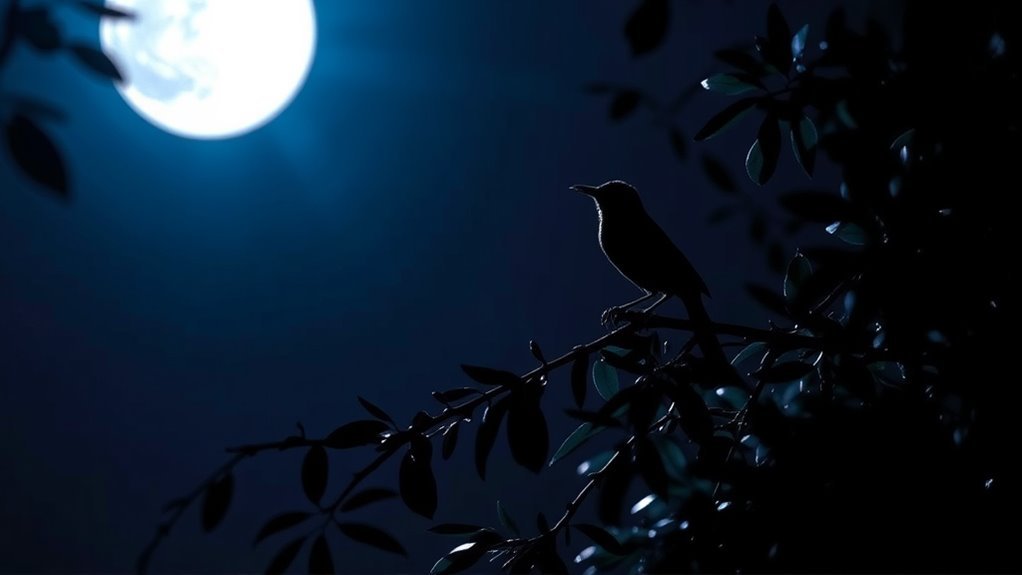Bird Chirping at Night: What Does It Mean?
Birds chirping at night often raises questions about why they make noise in the dark. Species like the nightingale and whip-poor-will vocalize at night for important reasons. Their calls help establish territory and attract mates. Environmental factors, such as temperature and moonlight, also influence this behavior. Understanding these aspects shows how nocturnal birds interact with their environment. What does this tell us about their adaptations?
Key Takeaways
- Nocturnal birds, like common owls and nightingales, sing at night for mating and territorial purposes.
- Nighttime songs help avoid predators and lower competition for sound space.
- Environmental factors, such as temperature and moonlight, influence increased singing activity.
- Urbanization leads to changes in vocalization patterns due to noise pollution and habitat loss.
- Night singing enhances social bonds among birds and increases appreciation for nature.
Understanding Nocturnal Bird Behavior

Some birds sing at night instead of the morning. These species have adapted to thrive in darkness and use their calls for mating or marking territory.
Their songs change in pitch and volume to be heard better in low light. This behavior helps them survive when predators are less active.
Common Species Known for Nighttime Chirping
Many bird species are known for their nighttime chirping. Notable examples include the common owl, the nightingale, and the whip-poor-will.
The Eastern Screech Owl adapts well to urban areas and fills the night with its distinct calls. Nightingales are often found in rural settings but can also grace urban gardens with their beautiful songs. The whip-poor-will is recognized by its repetitive call and thrives in woodlands and fields, adding to the nighttime atmosphere.
These birds serve important roles in their ecosystems. Their sounds help with mating and marking territory.
Learning about these species improves appreciation for the rich life that exists at night in our surroundings.
Reasons Birds Sing at Night

Birds sing at night for several important reasons. Their nighttime songs help mark their territory, alerting other birds to their presence.
During mating season, singing at night can attract mates, increasing their chances of reproduction.
Nighttime brings lower competition and fewer predators, making this time advantageous for birds.
Singing also helps birds communicate with others in shared habitats, strengthening social connections.
Understanding these behaviors enhances our appreciation of nature and highlights the balance that supports life around us.
Environmental Factors Influencing Nighttime Chirping
As urban areas grow, environmental factors influence how and when birds chirp at night. Here are three main aspects that affect their singing:
- Temperature changes: Birds respond to warmer nights by singing more. They use singing to save energy and adapt to temperature shifts.
- Moonlight: Bright moonlight encourages birds to sing. It helps them see better and communicate with each other.
- Urban noise: Human activity creates noise pollution. This forces birds to change their calls so they can be heard over the background sounds.
Understanding these factors helps us appreciate the difficulties birds face as their environments change.
The Role of Mating Calls in Nocturnal Singing

Many factors influence bird singing at night, but mating calls are very important. These calls help males attract potential mates.
Different species perform courtship displays using their sounds to show their fitness and genetic quality. The pitch, rhythm, and frequency of these calls provide information about a bird's health and energy. For example, a male that maintains a consistent pattern may show stamina, making him more attractive to females.
Impacts of Urbanization on Bird Behavior
Urban areas significantly impact bird behavior, especially their vocalizations at night. As cities grow, birds face habitat loss and noise pollution. These changes affect how they communicate and interact with their environment.
Here are three ways urbanization influences bird behavior:
- Changed Vocalization: Birds adjust their songs and calls to higher frequencies or different timings to stand out against background noise.
- More Nighttime Activity: Urban birds often become more active at night to find food and interact with others.
- Bolder Behavior: Some birds learn to take risks, finding food in urban spaces despite potential dangers.
These adaptations show how birds can thrive in new environments. Understanding these changes enhances our appreciation for their resilience and ability to adapt.
How to Appreciate Nighttime Birdsong
Appreciating nighttime birdsong offers insight into bird communication that we often miss during the day.
To enjoy this experience, start by finding a quiet area with low light. Listen carefully to the different sounds; each bird species has unique calls used for various reasons, like signaling territory or attracting mates. Keep a notebook handy to note your observations.
This practice boosts your connection to the activity and can help you bond with other birdwatching enthusiasts. You may also notice how their sounds change with the moon phases or the seasons.
Frequently Asked Questions
Do All Bird Species Chirp at Night?
Not all birds chirp at night. Only some species sing during the night. They often do this for mating or marking territory. Learning about these habits helps you connect with nature and appreciate how birds communicate.
Can Nighttime Noises Affect Bird Singing?
Nighttime noises can affect bird singing. In urban areas, the sounds of traffic and other activities can disrupt birds' natural singing patterns. This disruption may cause stress for the birds. As a result, their communication and behavior can change. This influences their survival strategies in the city environment.
How Can I Attract Nocturnal Birds to My Yard?
To attract nocturnal birds to your yard, install feeders at night with seed types they like, such as millet. Use soft garden lights to brighten feeding areas. This helps create an inviting space for the birds to come and explore your yard. Enjoy watching them visit as you make your yard a cozy spot for these nighttime creatures.
Is Night Chirping Linked to Weather Changes?
Night chirping can indicate weather changes. Birds often increase their activity before storms. They respond to shifts in humidity and temperature. This behavior signals the approach of changing conditions. Observing their chirping patterns can help predict the weather.
Are Certain Times of Night Better for Birdwatching?
The best times for birdwatching are early mornings and late afternoons. During these periods, birds are most active. You can see a variety of species and enjoy the peacefulness of nature. This makes it a great time for observing and connecting with wildlife.

Hello, I’m Emily Price, the founder of Birds Affection. As a passionate bird enthusiast and spiritual seeker, I’ve always been fascinated by the symbolic meanings and mystical connections between birds and our lives. On this website, I share my knowledge and insights on the spiritual significance of various bird species, exploring their roles as messengers, guides, and teachers. Through my writing, I aim to inspire and educate others on the profound wisdom and beauty that birds bring to our world. Join me on this journey as we delve into the enchanting realm of bird symbolism and discover the hidden meanings behind these magnificent creatures.







